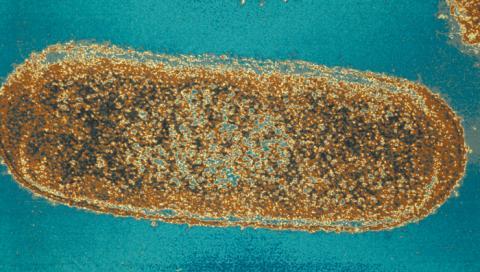Scientists at the Institut Pasteur and CNRS have shown that the use of low dose antibiotics can increase the emergence of resistance among pathogenic bacteria. They have observed that a low concentration of antibiotics is enough to activate a stress response in these bacteria. This response, known as "SOS", leads to the acquisition of resistance genes via two separate pathways. This work is the subject of an article published online on the Plos Genetics website on April 11.
Press release
Paris, april 11, 2013

Environments as diverse as waste water or patients undergoing antibiotic treatment may have a high bacterial concentration and low levels of antibiotics. The physiological effects of these low concentrations of antibiotics on bacteria and genetic events are not currently fully understood. However, work carried out by Professor Didier Mazel, head of the Bacterial Genome Plasticity Unit, and Zeynep Baharoglu, scientist within the same unit (Institut Pasteur / CNRS), has cast new light on this aspect.
The scientists have shown that low concentrations of antibiotics belonging to the aminoglycoside family (used in the hospital environment to treat numerous infections) contribute to the acquisition of resistance genes in several pathogenic bacteria (such as Vibrio cholerae, the infectious agent of cholera, or Klebsiella pneumoniae, which causes respiratory infections). They have been able to explain this phenomenon by observing the following mechanism: low-level antibiotic concentrations - even a hundred times lower than lethal concentrations - trigger a stress response in the bacterium. This is known as an SOS response, and occurs when the bacterial DNA is under threat, encouraging the acquisition of resistance genes in two ways. Firstly, it causes an increase in mutation frequency within the bacterial genome. Secondly, it activates the protein integrase, the role of which is to act on DNA sequences known as integrons, which are frequent carriers of resistance genes, integrating them into or excising them from the bacterial genome. The scientists have also gained an understanding of why, in the presence of aminoglycosides, the SOS response is missing in Escherichia coli bacteria, even though it is triggered in other species that are genetically very similar. The key to the mystery lies in the stabilization of the RpoS protein in E. coli, which acts as a stress regulator in bacteria. The scientists observed that, in the presence of aminoglycosides, RpoS inhibits the production of oxidative stress, which is responsible for the induction of the SOS response in other bacteria.
These findings suggest that the induction of the SOS response is an essential vector for the acquisition of new bacterial resistance. Accordingly, the factors and intermediaries involved in triggering this response are potential targets for the development of new antibacterial treatments. Identification of the RpoS factor could lead to the development of potential antibiotic adjuvants to limit the impact of antibiotics in low concentrations.
--
Illustration - Copyright Institut Pasteur
Caption – Vibrio Cholerae, the infectious agent of cholera
Sources
RpoS plays a central role in the SOS induction by Sub-lethal aminoglycoside concentrations in Vibrio cholerae, Plos Genetics, April 11, 2013.
Zeynep Baharoglu (1,2), Evelyne Krin (1,2), and Didier Mazel (1,2)
1. Institut Pasteur, Bacterial Genome Plasticity Unit, Genomes and Genetics Department, Paris, France
2. CNRS, UMR3525, Paris, France
Contact
Institut Pasteur Press Office
Nadine Peyrolo : + 33 (0)1 45 68 81 46
Jérémy Lescène : +33 (0)1 45 68 81 01
presse@pasteur.fr


